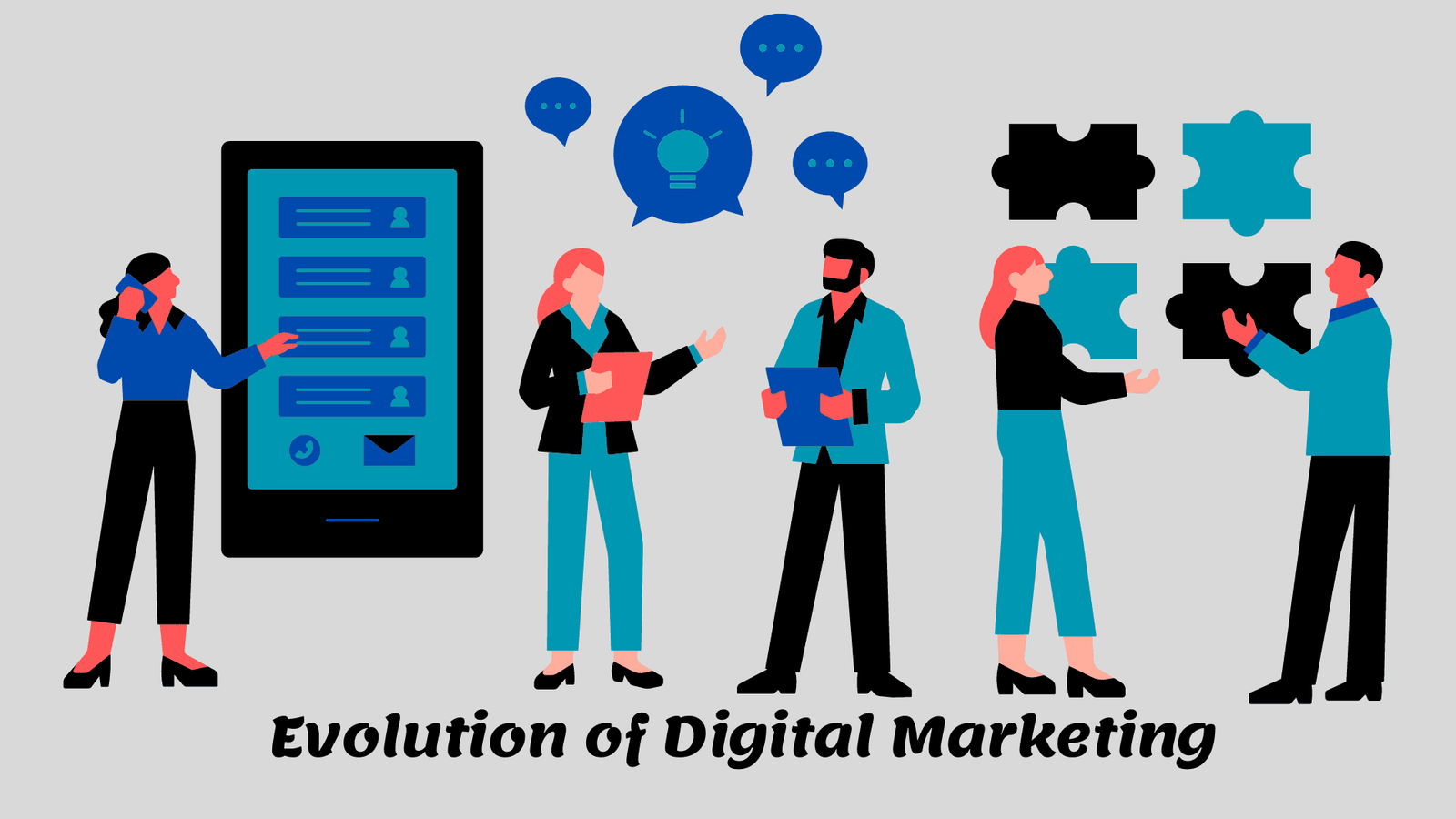Evolution of Digital Marketing; In today’s fast-paced and technologically driven world. Digital marketing has become an essential tool for businesses of all sizes and industries. With the ever-increasing reliance on digital platforms and the widespread use of smartphones and internet connectivity. Also, The opportunities for reaching and engaging with audiences have expanded exponentially.
The Evolution of Digital Marketing: Unleashing the Power of the Digital Age
This article explores the evolution of digital marketing. Its key components, and how it has revolutionized the way businesses connect with consumers in the digital age.

The Rise of Digital Marketing:
Digital marketing encompasses a wide range of strategies and techniques aimed at promoting products, services, and also brands through digital channels. It has experienced a significant rise in popularity due to several factors. Firstly, the accessibility of the internet and the proliferation of smartphones have made it easier. Than ever for businesses to connect with potential customers. Secondly, the ability to target specific audiences based on demographics, interests, and behavior has made digital marketing highly effective in delivering personalized messages to the right people at the right time.
Key Components of Digital Marketing:
a) Search Engine Optimization (SEO): SEO focuses on optimizing websites and content to improve their visibility and ranking in search engine results. By utilizing relevant keywords, creating high-quality content, and also building backlinks, businesses can enhance their online presence and attract organic traffic.
b) Social Media Marketing: Social media platforms have become integral to digital marketing strategies. With billions of active users, platforms like Facebook, Instagram, Twitter, and LinkedIn offer businesses a vast audience to engage with. Through targeted advertising, content creation, and community management, businesses can build brand awareness, foster customer loyalty, and drive conversions.
c) Content Marketing: Content marketing involves creating and distributing valuable, relevant, and consistent content to attract and retain a target audience. It includes blog posts, articles, videos, infographics, and more. Effective content marketing establishes businesses as thought leaders, educates consumers and helps build trust and credibility.
d) Pay-Per-Click Advertising (PPC): PPC advertising allows businesses to display ads on search engines and other websites, paying only when users click on the ads. Platforms like Google Ads and Bing Ads enable businesses to target specific keywords and demographics, ensuring their ads are seen by relevant audiences. Also, PPC campaigns can generate immediate traffic and conversions.
e) Email Marketing: Email marketing remains a powerful tool for nurturing customer relationships and driving conversions. By crafting compelling email campaigns, businesses can reach out to their target audience directly. Deliver personalized messages, promote products or services, and encourage customer loyalty.
The Power of Data and Analytics:
One of the greatest advantages of working with a digital marketing agency is the ability to gather vast amounts of data and gain insights into consumer behavior. Tools such as Google Analytics provide businesses with valuable information about website traffic, user engagement, conversion rates, and more. These insights enable marketers to refine their strategies, optimize campaigns, and make data-driven decisions to achieve better results.
The Future of Digital Marketing:
As technology continues to advance, the future of working with digital marketing agency holds even more exciting possibilities. Emerging technologies like artificial intelligence (AI), virtual reality (VR), and augmented reality (AR) are set to transform the way businesses engage with consumers. AI-powered chatbots and voice assistants are already enhancing customer experiences, while VR and AR offer immersive and interactive marketing opportunities.
Digital marketing has become an indispensable tool for businesses seeking to thrive in the digital age. Also, Its ability to reach and engage with audiences on various platforms has revolutionized the way brands connect with consumers. As technology continues to evolve, businesses must stay agile, adapt their strategies, and embrace new opportunities to leverage the power of digital marketing. By harnessing the potential of SEO, social media marketing, content marketing, PPC advertising, and data analytics, businesses can unlock


Leave a Reply